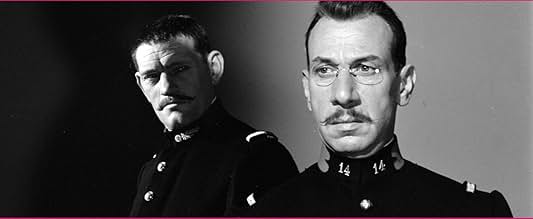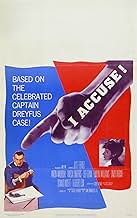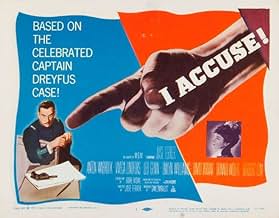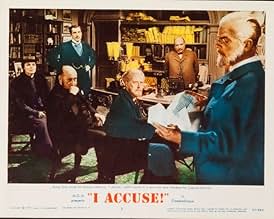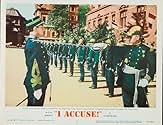Füge eine Handlung in deiner Sprache hinzuIn 1894 France, a Jewish officer in the French Army is falsely accused of spying for Germany.In 1894 France, a Jewish officer in the French Army is falsely accused of spying for Germany.In 1894 France, a Jewish officer in the French Army is falsely accused of spying for Germany.
- Regie
- Drehbuch
- Hauptbesetzung
José Ferrer
- Captain Dreyfus
- (as Jose Ferrer)
Empfohlene Bewertungen
Great story for then and now about politics and false accusation. Acting was great. Movies from 30's 40's and some 50's are of great quality. Well written and filmed. You will enjoy. Reminds me of Les Misérables. But seems more real like in the story.
A most excellent portrayal of men, politics and truth and how truth is given a back set to the affairs of men. This story is as old as mankind itself. To see someone unjustly and falsely accused of a crime and not be able to do anything about it summons the deepest feelings one can have for life itself and of course the life giver. This story comes to you at a price...the price of a mans life. You see its true he suffered and then continued to suffer in a place made for suffering exclusively i.e. Devils Island prison. The french were notorious for punishment and being a french traitor made you especially un-welcomed on the island. Man is not perfect as we learned in Victors Hugo accounting called Les Miserable. That is why here in America, we would rather see 12 guilty people go free before we convict or condemn an innocent person. This movie drives home that point. Don't fight the emotional scenes when they come. There are a few and they can clean you out if you let them..
Jose Ferrer was indubitably intelligent and impeccably liberal, as he was sure to let you know. He made a number of rather good movies, but he was not as brilliant as he thought, and his lack of the conventional movie virtues such as charm, sex appeal, or just friendly warmth was far more damaging than he knew.
This movie presents the story clearly and fairly, and there are some good performances, but on the whole it's very cold and dry.
Gore Vidal's script is also intelligent and, rarely for Hollywood historical films, does not contain a single vulgarism or anachronism. But, again, a few of these would be a small price to pay for some zest and passion. A more surprising omission is wit, which one would have expected from Vidal.
And there is another omission. The Dreyfus case was an indication of the degree of anti-semitism among the French as a whole, not only the military. The hatred of Jews that the case provided an opportunity to express was so intense, widespread, and violent that many left the country. We are told at the beginning of the film that Dreyfus is a Jew, and a bit later there are a couple of mentions of the fact that most people do not like or trust them. But that's it. There is no sense at all of the vicious and hysterical feelings that were voiced by the ignorant public and whipped up by the media. The mobs have only a pathetic two or three placards, none of which mention Jews, and when they shout insults we do not hear the word. Ironically, this is a heavily censored movie about people who do not tell the truth.
As Dreyfus, Ferrer is very correct, proper, and unimaginative. After he is cruelly mistreated we see him suffer, but his pain is not has affecting as it should be--there is something actorish about it. The acting honors go to David Farrar as Dreyfus's brother and Leo Genn as his one supporter on the general staff--indeed, the latter looks so good in his full moustache and acts so suavely that we seem at times to be watching James Mason.
You really know the movie has failed when the person in whom we are most interested, and most anxious to see again, is Esterhazy, the real spy, who throws the innocent Dreyfus to the wolves. Anton Walbrook is so steeped in seedy charm, so much the would-be languorous fatalist with one eye nervously alert that we are keen to see someone with an active mind rather than another puppet in this story that is far more complex and unsavory than the film makes out.
Gore Vidal's script is also intelligent and, rarely for Hollywood historical films, does not contain a single vulgarism or anachronism. But, again, a few of these would be a small price to pay for some zest and passion. A more surprising omission is wit, which one would have expected from Vidal.
And there is another omission. The Dreyfus case was an indication of the degree of anti-semitism among the French as a whole, not only the military. The hatred of Jews that the case provided an opportunity to express was so intense, widespread, and violent that many left the country. We are told at the beginning of the film that Dreyfus is a Jew, and a bit later there are a couple of mentions of the fact that most people do not like or trust them. But that's it. There is no sense at all of the vicious and hysterical feelings that were voiced by the ignorant public and whipped up by the media. The mobs have only a pathetic two or three placards, none of which mention Jews, and when they shout insults we do not hear the word. Ironically, this is a heavily censored movie about people who do not tell the truth.
As Dreyfus, Ferrer is very correct, proper, and unimaginative. After he is cruelly mistreated we see him suffer, but his pain is not has affecting as it should be--there is something actorish about it. The acting honors go to David Farrar as Dreyfus's brother and Leo Genn as his one supporter on the general staff--indeed, the latter looks so good in his full moustache and acts so suavely that we seem at times to be watching James Mason.
You really know the movie has failed when the person in whom we are most interested, and most anxious to see again, is Esterhazy, the real spy, who throws the innocent Dreyfus to the wolves. Anton Walbrook is so steeped in seedy charm, so much the would-be languorous fatalist with one eye nervously alert that we are keen to see someone with an active mind rather than another puppet in this story that is far more complex and unsavory than the film makes out.
A film based on the infamous Dreyfus Affair wherein a French soldier is convicted & imprisoned for a crime he did not commit & eventually due to the protestations of the populace & the well known writer Emile Zola, he was eventually acquitted. Directed by & starring Jose Ferrer, this heart in its right place account of the trials & tribulations of this railroaded individual comes off as a rather important history lesson then an affecting drama. There was a version done on HBO in the 90's called Prisoner of Honor (directed by Ken Russell) which tackled the same subject matter & I remember the result was about the same. It may be a case of the trial being more of a cause celebre outside this country which may leave American viewers a bit on the periphery where we agree the stakes are obvious & noble but w/o a frame of reference ultimately we kind of shrug it off. Perhaps a French version (much like Cyrano de Bergerac w/Gerard Depardieu for me is the consummate version of the tale while the 50's version also w/Ferrer which he won the Oscar for is pretty good but not as good as its foreign language descendant) will do the trick.
This film is based on the true story of Captain Dreyfus of the French Army who, based on weak evidence, is wrongly accused of treason. The film takes place over a seven year period beginning in 1894 Captain Dreyfus comes from a wealthy industrial family but because of love of his country, joins the military rather than help run the family business. His family are Jewish and originally come from an area of Germany. It is discovered that a spy within the officers assigned to a leading General is selling military secrets to foreign agents. Dreyfus is a dour, by-the-book, military Beauregard who has no friends within the command and because of his Jewish and German heritage the military makes him a scapegoat to the crime. Jose Ferrer stars and directs an international cast. Based on the book by Nicholas Halasz, I Accuse is adapted by novelist Gore Vidal in the 2nd screenplay of his career. Photographing this film is veteran cinematographer Freddie Young, whose career lasted 57 years and included three Oscars for Doctor Zhivago, Ryan's Daughter and Lawrence of Arabia. Vivica Lindfors, who was my 4th cousin, plays Dreryfus' wife Lucie. Also among the cast are Anton Walbrook, Donald Wolfit and Herbert Lom. Ferrer is kind of dry and one dimensional and plays the entire film with one emotion. There is not a lot for Lindfors to do. Several of the cast turn in fine performances in this film that was made to mirror the recent McCarthy era witch hunts. There are no closeups and the entire film uses heavy shadows in every scene, indoor and out. This film was remade with Richard Dreyfus who is said to be a family descendant of Captain Dreyfus in the starring role. It's a good historical drama but as a film it falls a little short. I would give it a 7.5 out of 10.
Wusstest du schon
- WissenswertesThis movie was not shot in widescreen. It was converted to CinemaScope in the final print after having been shot in standard Academy ratio, much like some movies, which are "matted" after having been shot in Academy ratio. The process used was contemporary of SuperScope and a forerunner of Super 35. It was filmed using spherical lenses at an aspect ratio of 1.37:1. In the printing process, the images were cropped to a height of two perforations, giving them an aspect ratio of 2.36:1. The images were then stretched vertically to a height of four perforations, at which point they conformed to the standard CinemaScope-2 format.
- Zitate
Émile Zola: This Esterhazy is one of the most glorious liars that ever drew breath. Why, the authority of it, the poise; the man's a genius!
- Crazy Credits[Scrolling Prologue] In 1894 Alfred Dreyfus, a French Army officer, stood before a military tribunal accused of treason. The outcome of this trial, a trial that created an international sensation, is a brave chapter in the history of France, that nation which first proclaimed the Rights of Man.
Top-Auswahl
Melde dich zum Bewerten an und greife auf die Watchlist für personalisierte Empfehlungen zu.
- How long is I Accuse!?Powered by Alexa
Details
Box Office
- Budget
- 1.800.000 $ (geschätzt)
- Laufzeit
- 1 Std. 39 Min.(99 min)
- Farbe
- Sound-Mix
- Seitenverhältnis
- 2.35 : 1
Zu dieser Seite beitragen
Bearbeitung vorschlagen oder fehlenden Inhalt hinzufügen

